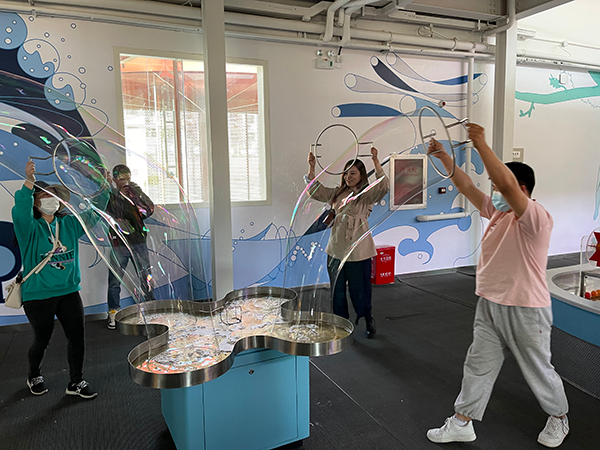Repurposed factory manufactures family entertainment
By YANG FEIYUE | China Daily | Updated: 2021-04-29 09:24

Li Junman opened the Hi Ma Ma resort in Beizhuang village of Miyun district in Beijing in March.
The factory-turned resort provides educational, yet happy, experiences for children and their parents during their stay. Various packages are on offer, and prices range from a few hundred to over 1,000 yuan ($152).
"We are fully booked on weekends until June 30," Li says.
The place integrates scientific exploration with natural and art education in a rural setting, and offers modern accommodation and catering services.
"We hired about 50 locals in the neighborhood," Li says, adding that many young villagers have chosen to work here and stay closer to home.
"It is a former textile factory," Li adds.
Old sewing machines from home and abroad are displayed for visitors to better understand the history of the resort, while farming, mathematics and physics projects offer children a fun learning experience.
The remodeled houses at the resort have been built on the existing structures of the old buildings, and include the original tiles and bricks. The interiors are well-furnished. Old workshops of the factory have been turned into painting and science labs. A big trampoline and other items for kids' activities are placed in the open space.
The resort has been approached by many primary and middle schools in Beijing, and cooperation agreements have been signed for students to do extracurricular programs there, Li says.
About 10 minutes by road from the resort is a homestay cluster that Xue Guangfeng is preparing for his guests during the upcoming Labor Day holiday.
Xue owns land in Zhujiawan village that had been vacant for years. He decided to build homestays in 2017 after seeing his neighbors do brisk business. He had renovated old houses that feature gray-tiled roofs and red-bricked walls. Some of the rooms are equipped with traditional heated brick beds that were common in China in the old days, while some offer Japanese-style tatami and hot plates like those in South Korea.
"They are especially popular among customers with children," Xue says.
All of his 22 rooms were booked during Qingming Festival, or Tomb-Sweeping Day, in early April.
Travelers can walk along the Qingshui River nearby that leads to the Miyun Reservoir.
"Everything here remains in a natural state, with many reeds and animals," Xue adds.
He has developed a greenhouse where visitors can pick vegetables. Farming, hiking and barbecue experiences are also available for his guests.
Miyun has invested in the construction of hotels and homestays to promote rural tourism for years. It has now developed over 260 courtyard homestays.
The district recently launched themed routes related to blossoms, gourmet food, homestays and folk culture for spring.
Visitors can enjoy peach and apricot blossoms, as well as azaleas in Beijing WTown, Yunmeng Mountain, Qingliang Valley and Heilongtan park. Pear blossoms can be found in the district's Bulaotun and Mujiayu townships, and cherry blossoms in Jinpoluo village and Mujiayu township.
As for food, the millet, buckwheat and chestnut banquets in Xiwengzhuang and an all-chicken feast in Mujiayu are big draws. To spice up the visitor experience, Beijing WTown has developed night tours of the Simatai section of the Great Wall. Visitors can enjoy water, music and drone shows there.
Such experiences have packed in travelers from Beijing, Tianjin and Hebei province, according to the district's publicity department.
To vitalize rural tourism and culture, Miyun has rolled out favorable policies and announced major projects. Businesses that invest at least 50 million yuan will receive 1 percent of the actual investment amount back through various incentives. Top-rated homestays and hotels will be given prize money, ranging from 100,000 to 500,000 yuan, based on the district's policy.
The district will continue to support distinctive homestays, rural tourism destinations, museums, libraries and bookstores to become a demonstration zone for culture, travel and leisure experiences in 2021,according to a tourism development conference organized last year.
The goal is to boost quality tourism and carry out President Xi Jinping's call for continued efforts to preserve the Miyun Reservoir, the major source of drinking water for Beijing, and fully advance the building of an ecological civilization.
The district is striving to increase the income of its major scenic spots by 40 percent year-on-year to 826 million yuan by the end of next year, according to the district's publicity department.
























